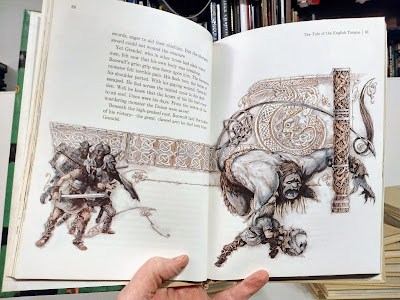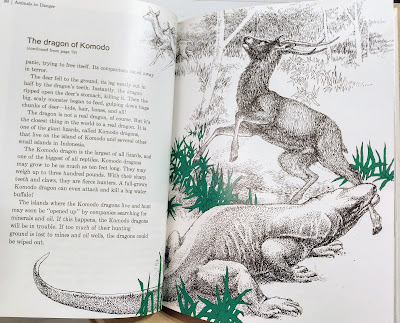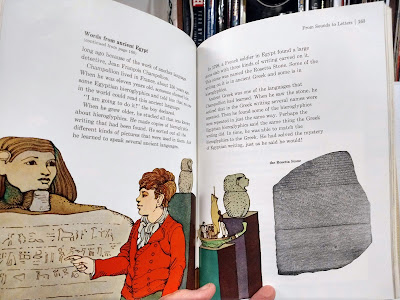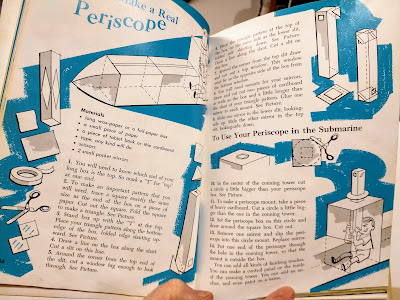But the second shelf is what brought me joy and taught me to love learning and knowledge: the Childcraft series, also known as the "How and Why Library."
15 volumes, each dedicated to a specific theme such as "How Things Work," "About Animals" or "World and Space." Truly, these were a timely blessing to a pre-internet childhood (and one with only three television channels).
Many were the Sunday afternoons or time between school and supper where I would pore over various volumes, some more so than others. About Animals was a favourite, as was World and Space - less so the Poems and Rhymes. But I remember reading most if not all the stories in the Children Everywhere volume, returning many times to read a short tale about a Swiss boy who rescues a marmot from a golden eagle, and a Lithuanian boy who climbs a tower to fly the old flag in the face of an occupying Soviet regime.
Some of the illustrations were remarkable, depicting an impossibly dense field of stars or an intimidating triggerfish.
I am also confident that a straight line can be drawn from the lavish illustrations of Beowulf and my later readings of The Lord of the Rings and Conan.
Looking through the books recently, the things I hadn't remembered gave me pause for thought - had my love of mythology spawned from these stories and drawings?
Were they my first exposure to my favourite dinosaur*?
*Look, I know the dimetrodon is technically not a dinosaur and is instead merely a prehistoric lizard, but it still shows up in packs of dinosaur toys, so let it go, all right?
Was this where my appreciation/revulsion/horror regarding the komodo dragon, an enormous monitor lizard with powerful jaws and saliva that was not only venomous but also acidic, began?
But it was the 1975 Annual "The Magic of Words" that provided the most insight into my younger self.
Wherein I learned the provenance of names leading from ancestral occupations, and how "ghoti" could be pronounced "fish" if you put enough spin on it...
The first time I had ever come across Shakespeare was in this beautiful and whimsically illustrated scene from A Midsummer Night's Dream."
And learning that the Rosetta stone was cracked by a man who had seen the artifact as a boy and determined then that he would be the one to learn what the hieroglyphics within it were trying to convey to us, centuries later. Like a real-life Hardy Boy (my other familiar literary companions of childhood) he seemed to me.
My love of etymology and vocabulary, my appreciation for legend and history, and my enjoyment of trivia can probably all be traced to this one book within a remarkable set.
I loved reading these books, and I loved having a frame of reference for many of the things the teachers spoke of in elementary school. Constantly raising my hand, always happy to volunteer an answer or ask a question about something not covered yet, I quickly developed a reputation as a brainy kid. And I adored it and leaned into it, probably more than I should have, honestly.
But despite the fact I bought a slide rule at a yard sale and a book on how to use it at the second-hand book shop on main street, it was never just an affectation - I honestly did love knowing things, and sharing the interesting things I found out about. I still do, obviously.
And I am still tremendously grateful for these books, a collection that answered hundreds of questions but galvanized a thousand other inquiries. I am a bit sad that the girls never found them as appealing as I did, but on the other hand, this spared me explaining why we weren't building a cardboard submarine, as I always pestered my father about...
And neither of them have asked to have potato chips crumbled on top of tunafish casserole, as I begged my mother for at least quarterly...
But I can't believe they will appreciate them as much as I did.
Thanks, Mum and Dad - I wish this revelation about how influential this one, doubtlessly significant purchase was on me had come earlier so I could have shared it with you.
But knowing you, you probably knew it more than I did.























No comments:
Post a Comment